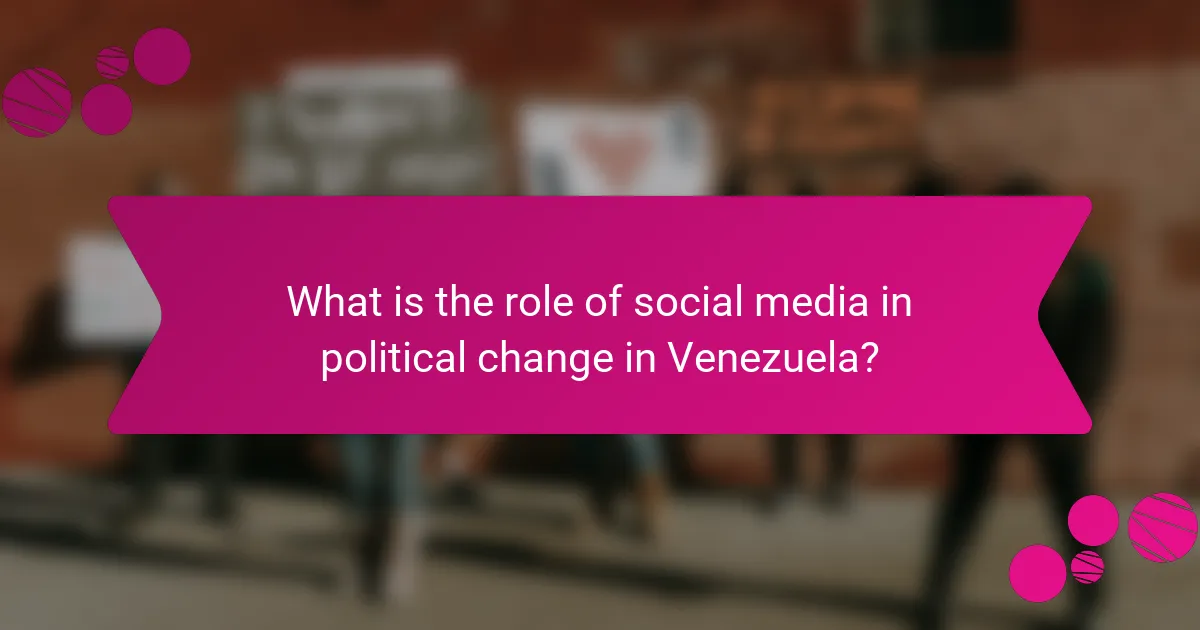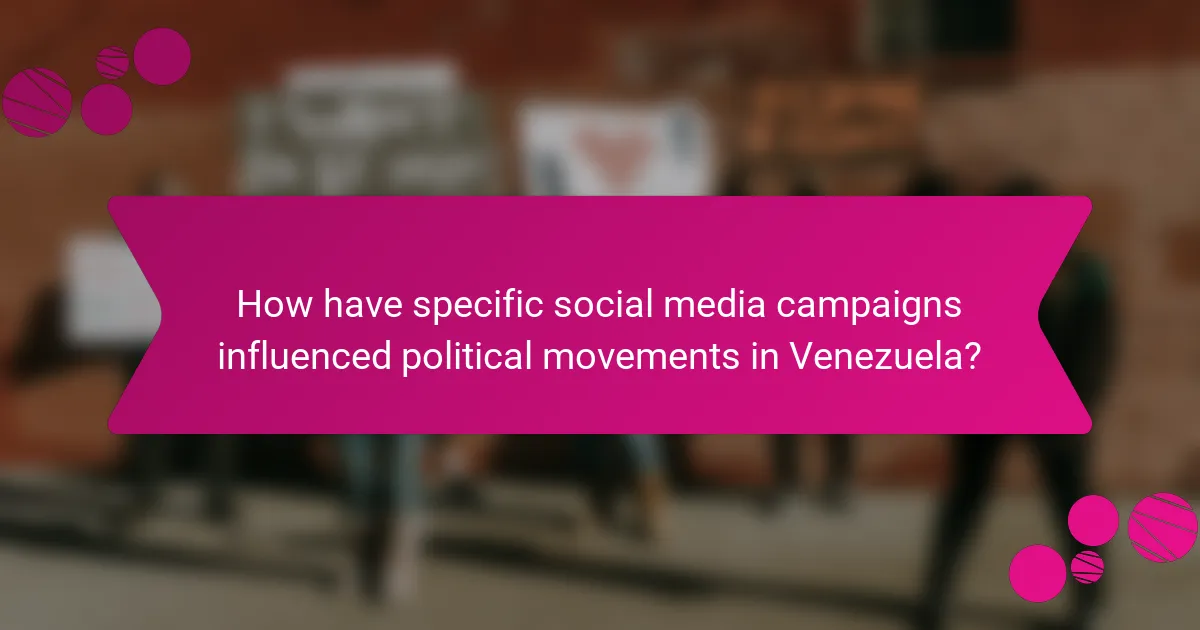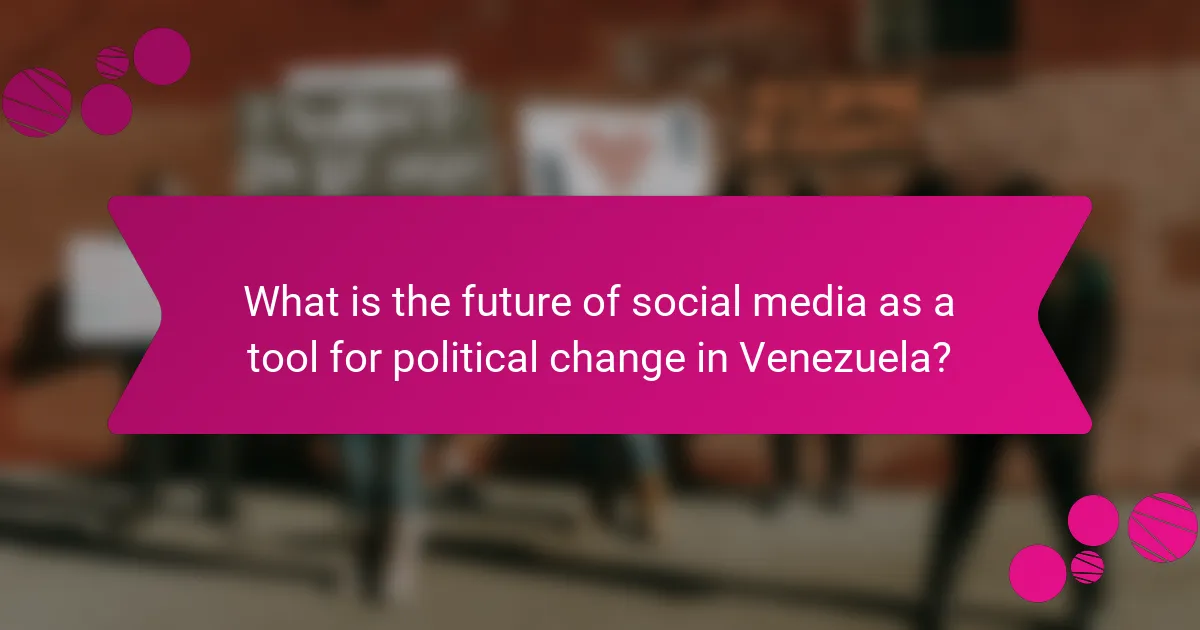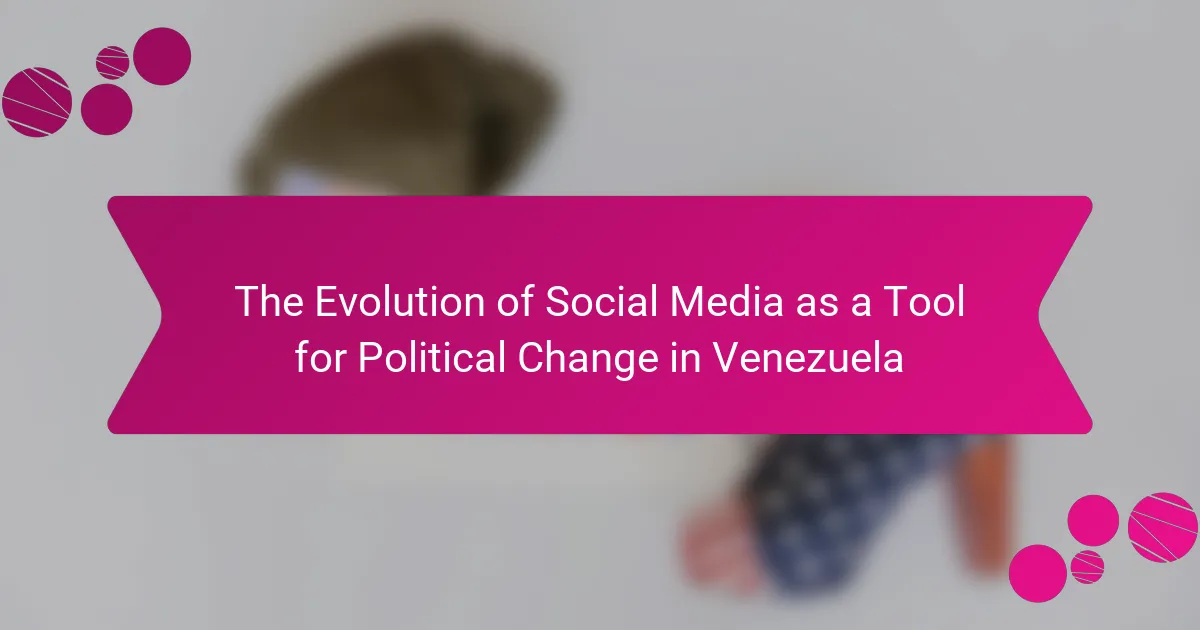
What is the role of social media in political change in Venezuela?
Social media plays a crucial role in political change in Venezuela. It serves as a platform for mobilizing citizens and disseminating information. During protests, social media has facilitated real-time communication among activists. It allows users to share updates, organize events, and rally support. In 2014 and 2017, platforms like Twitter and Facebook were vital for coordinating demonstrations against the government. Additionally, social media has been instrumental in bypassing state-controlled media. It provides an alternative source of news and commentary, often highlighting government abuses. This has helped raise international awareness about the political situation in Venezuela. Consequently, social media has become a powerful tool for political activism and change in the country.
How has social media evolved as a political tool in Venezuela?
Social media has evolved into a crucial political tool in Venezuela. Initially, platforms like Twitter and Facebook facilitated communication among opposition groups. They allowed citizens to organize protests and share real-time information. During the 2014 protests, social media was essential for mobilizing support against the government. The Venezuelan government responded with censorship and internet shutdowns. Despite this, citizens continued to use VPNs to bypass restrictions. In recent years, social media has become a platform for political leaders to communicate directly with the public. The 2019 presidential crisis highlighted the role of social media in international awareness and support. Overall, social media has transformed how political discourse occurs in Venezuela.
What key events marked the rise of social media in Venezuelan politics?
The rise of social media in Venezuelan politics was marked by several key events. The 2002 coup attempt against President Hugo Chávez saw increased use of platforms like Twitter and Facebook for communication. In 2007, Chávez launched the “Venezuelan Social Network,” promoting social media as a political tool. The 2014 protests against the government utilized Twitter to organize and disseminate information rapidly. In 2017, the Venezuelan opposition used social media to mobilize citizens against the government amid economic crises. The 2018 presidential election saw social media campaigns from both the government and opposition, highlighting its political significance. These events demonstrate how social media became integral to political mobilization and discourse in Venezuela.
How did social media platforms gain popularity among Venezuelans?
Social media platforms gained popularity among Venezuelans due to the need for communication and information sharing during political and economic crises. The Venezuelan government imposed restrictions on traditional media, leading citizens to seek alternative sources of news. Platforms like Twitter and Facebook became vital for real-time updates and organizing protests. High internet [censured] rates facilitated access to these platforms. Additionally, social media allowed for the mobilization of grassroots movements. The use of hashtags and viral content amplified messages, increasing engagement. Reports indicate that social media played a crucial role in the 2014 protests against the government. This demonstrated the platforms’ effectiveness in fostering political discourse and activism.
What are the main features of social media that facilitate political change?
Social media features that facilitate political change include rapid information dissemination, user engagement, and mobilization capabilities. Rapid information dissemination allows news and updates to spread quickly, reaching large audiences almost instantly. For instance, during political protests, platforms like Twitter and Facebook provide real-time updates, which can influence public opinion and action. User engagement fosters discussions and debates, enabling citizens to share their views and rally support for causes. Mobilization capabilities allow organizations to coordinate events and protests efficiently, as seen in the Venezuelan protests where social media was pivotal in organizing demonstrations. These features collectively empower citizens, promote transparency, and challenge traditional media narratives, contributing to significant political shifts.
How does social media enable communication and mobilization?
Social media enables communication and mobilization by providing a platform for instant information sharing. It allows users to connect across geographical boundaries. This connectivity facilitates the rapid dissemination of news and updates. For instance, during political protests in Venezuela, social media played a critical role. Hashtags like #SOSVenezuela organized and amplified voices of dissent. Studies show that 80% of Venezuelans use social media to engage in political discussions. This engagement fosters community and collective action. Consequently, social media serves as a vital tool for mobilizing support and coordinating protests.
What role does social media play in shaping public opinion?
Social media significantly influences public opinion by providing a platform for information dissemination and engagement. It allows users to share news, opinions, and experiences rapidly. This immediacy can shape perceptions on political issues and events. In Venezuela, social media has been pivotal during political unrest. For instance, platforms like Twitter and Facebook have been used to organize protests and share real-time updates. Research indicates that social media can amplify voices that may not be represented in traditional media. A study by the Pew Research Center found that 62% of adults in Venezuela get news from social media. This demonstrates how social media serves as a primary source of information, impacting public sentiment and mobilization.
What challenges does social media face in the Venezuelan political landscape?
Social media in Venezuela faces significant challenges including censorship, government surveillance, and misinformation. The Venezuelan government actively restricts access to social media platforms. This limits citizens’ ability to share information freely. Additionally, the government monitors social media activity to suppress dissent. Misinformation campaigns also complicate the political discourse. These campaigns often originate from both state and non-state actors. Together, these factors hinder the effectiveness of social media as a tool for political change.
How do government restrictions impact social media usage?
Government restrictions significantly limit social media usage. These restrictions can include censorship, blocking specific platforms, or imposing fines for non-compliance. In Venezuela, the government has frequently restricted access to social media during political unrest. For instance, during protests, platforms like Twitter and Facebook have been temporarily blocked. This limits citizens’ ability to communicate and organize. Consequently, social media becomes less effective as a tool for political change. Studies indicate that such restrictions lead to decreased user engagement and hinder the spread of information.
What are the risks for activists using social media in Venezuela?
Activists using social media in Venezuela face significant risks, including government surveillance and harassment. The Venezuelan government actively monitors online activities to identify and target dissenters. This surveillance can lead to arrests, intimidation, and physical harm to activists. Additionally, social media platforms can be manipulated or censored by the government to suppress dissenting voices. Reports indicate that activists have been subjected to violence and threats as a result of their online presence. The environment for digital activism in Venezuela remains perilous, with many activists forced to operate anonymously to protect themselves.

How have specific social media campaigns influenced political movements in Venezuela?
Specific social media campaigns have significantly influenced political movements in Venezuela. Campaigns like #SOSVenezuela mobilized international awareness about the humanitarian crisis. These campaigns utilized platforms like Twitter and Instagram to disseminate real-time information. They helped organize protests and rallies, increasing public participation. The viral nature of these campaigns attracted global media attention. This pressure led to discussions in international forums regarding Venezuela’s political situation. Social media also provided a platform for opposition leaders to communicate directly with citizens. The ability to bypass traditional media restrictions empowered grassroots movements.
What notable campaigns have utilized social media for political activism?
Notable campaigns that have utilized social media for political activism include the 2014 Venezuelan protests. These protests, known as “La Salida,” mobilized thousands against government policies. Social media platforms like Twitter and Facebook were crucial for organizing events and sharing information. They enabled real-time updates and facilitated communication among protesters. The #SOSVenezuela hashtag gained international attention, highlighting the humanitarian crisis. Another significant campaign was the 2017 protests against President Nicolas Maduro. Activists used social media to document violence and human rights abuses. These campaigns demonstrate the power of social media in mobilizing political movements in Venezuela.
How did the #SOSVenezuela campaign mobilize international support?
The #SOSVenezuela campaign mobilized international support through social media activism. It raised awareness of the humanitarian crisis in Venezuela. The campaign utilized hashtags to engage users globally. It facilitated the sharing of personal stories from Venezuelans. These narratives highlighted the dire conditions faced by citizens. Influential figures and organizations amplified the message. Global protests were organized in solidarity with Venezuelans. The campaign successfully attracted media coverage, increasing visibility.
What strategies were effective in the #Elecciones2018 campaign on social media?
The #Elecciones2018 campaign effectively utilized targeted advertising on social media. This strategy allowed for reaching specific demographics with tailored messages. Engaging content, such as videos and infographics, captured user attention and encouraged shares. Real-time interaction with voters through live Q&A sessions fostered a sense of community. Influencer partnerships expanded reach and credibility among younger audiences. Hashtags, particularly #Elecciones2018, facilitated conversation and visibility. Data analytics informed campaign adjustments, optimizing messaging and outreach. These strategies collectively enhanced voter engagement and awareness during the campaign.
What impact did social media have during the protests in Venezuela?
Social media significantly impacted the protests in Venezuela by facilitating communication and mobilization among demonstrators. It enabled activists to share real-time updates and organize protests efficiently. Platforms like Twitter and Facebook served as vital tools for spreading information about government actions and human rights abuses. During the protests in 2014 and 2017, social media was instrumental in amplifying the voices of dissent. Hashtags like #SOSVenezuela gained international attention, raising awareness of the situation. The use of social media also helped to counter government propaganda. Reports indicated that over 70% of Venezuelans used social media to stay informed during the protests. This digital engagement played a crucial role in sustaining the momentum of the protests.
How did social media facilitate real-time information sharing during protests?
Social media facilitated real-time information sharing during protests by providing instant communication channels. Platforms like Twitter and Facebook allowed users to post updates, images, and videos as events unfolded. This immediacy enabled rapid dissemination of information among protesters and supporters. During the 2014 Venezuelan protests, hashtags like #SOSVenezuela went viral, spreading awareness globally. Social media also helped coordinate actions and mobilize participants effectively. The visual evidence shared online highlighted the realities of the protests, garnering international attention. This visibility pressured authorities and influenced public opinion. Overall, social media transformed the way information was shared, making it faster and more accessible.
What role did social media play in international awareness of the protests?
Social media significantly increased international awareness of the protests in Venezuela. Platforms like Twitter and Facebook enabled real-time sharing of information. Activists used hashtags to unify messages and draw global attention. Videos and images from the protests circulated widely, showcasing the situation on the ground. This visual content engaged international audiences emotionally and politically. News outlets relied on social media for updates, amplifying the protests’ visibility. According to a study by the Pew Research Center, 64% of social media users reported following news about the protests online. This digital engagement fostered global solidarity and support for the protesters.
How have social media platforms responded to political issues in Venezuela?
Social media platforms have actively responded to political issues in Venezuela by facilitating communication and mobilization. These platforms have allowed citizens to share information about protests and government actions. For instance, Twitter has been used extensively to organize demonstrations and disseminate real-time updates. Facebook has served as a space for community building and advocacy campaigns. In 2017, the Venezuelan government attempted to block access to social media during protests, highlighting the platforms’ role in political dissent. Instagram has also played a crucial role by enabling users to share visual content related to the crisis. Overall, social media has become a vital tool for political engagement and resistance in Venezuela.
What measures have platforms taken to combat misinformation in Venezuela?
Platforms have implemented various measures to combat misinformation in Venezuela. Social media companies have enhanced fact-checking processes. They collaborate with local fact-checking organizations to verify content. Platforms also label or remove false information. They promote credible sources to users. Some platforms have restricted accounts spreading misinformation. Algorithms have been adjusted to prioritize reliable content. These efforts aim to reduce the spread of false narratives. The effectiveness of these measures varies due to the complex political environment.
How have platforms adjusted their policies in response to government pressures?
Platforms have adjusted their policies by increasing content moderation and enhancing transparency. For example, Twitter has implemented stricter rules against misinformation. Facebook has also expanded its fact-checking initiatives to combat false narratives. These adjustments often align with government regulations and demands for accountability. In Venezuela, platforms have faced pressure to restrict certain political content. As a result, they have developed tools to allow users to report violations. This includes the ability to flag posts that may violate local laws. These changes reflect a broader trend of platforms adapting to governmental expectations. They aim to maintain compliance while balancing user freedom.

What is the future of social media as a tool for political change in Venezuela?
The future of social media as a tool for political change in Venezuela is likely to remain significant. Social media platforms have been pivotal in mobilizing protests and disseminating information. They have enabled citizens to bypass traditional media censorship. Historical events, such as the 2014 protests, highlighted social media’s role in organizing demonstrations. Additionally, the rise of digital activism is expected to continue. Data indicates that younger generations in Venezuela are increasingly using social media for political discourse. This trend suggests a growing engagement with political issues online. However, government crackdowns on internet freedom may pose challenges. The balance between activism and repression will shape social media’s effectiveness in the future.
What trends are emerging in the use of social media for political engagement?
Emerging trends in social media for political engagement include increased use of live streaming, short-form video content, and targeted messaging. Politicians and activists are leveraging platforms like TikTok and Instagram for real-time interactions. This approach fosters a sense of immediacy and connection with younger audiences. Additionally, data analytics are being utilized to tailor messages to specific demographics. This targeted approach enhances engagement and mobilizes support effectively. Hashtags and viral challenges are also becoming common tools for raising awareness and driving participation in political movements. These trends reflect a shift towards more dynamic and interactive forms of political communication.
How might technological advancements shape political discourse in Venezuela?
Technological advancements can significantly shape political discourse in Venezuela by enhancing communication and information dissemination. Increased internet access allows citizens to share their views more freely. Social media platforms enable real-time discussions and mobilization for political causes. These tools can challenge traditional media narratives, providing alternative perspectives. For instance, during protests, platforms like Twitter and Facebook have been crucial for organizing and spreading information. Additionally, advancements in mobile technology facilitate grassroots activism. Studies indicate that digital engagement can influence public opinion and political participation. Overall, technology empowers Venezuelans to engage in political dialogue and activism more effectively.
What role could new social media platforms play in future political movements?
New social media platforms could significantly enhance future political movements by facilitating communication and mobilization. These platforms allow for rapid dissemination of information, enabling users to share news and rally support quickly. They can empower marginalized voices and provide a space for grassroots organizing. In recent political movements, such as those seen in Venezuela, social media has been crucial in circumventing traditional media censorship. The use of hashtags and viral content can amplify messages and increase visibility. Additionally, new platforms often attract younger demographics, who are more likely to engage in activism. Historical examples, like the Arab Spring, demonstrate the effectiveness of social media in organizing protests and influencing political change. Thus, new social media platforms are likely to play a pivotal role in shaping future political landscapes.
What best practices can activists follow when using social media for political change?
Activists should prioritize clear messaging when using social media for political change. This involves crafting concise and compelling content that conveys their goals effectively. Engaging visuals, such as infographics and videos, can enhance message retention. Consistent posting schedules help maintain audience interest and visibility.
Collaborating with influencers can amplify reach. Influencers often have established followings that can be mobilized for causes. Activists should also monitor engagement metrics to assess the impact of their posts. Adapting strategies based on audience feedback is crucial for sustained engagement.
Using hashtags strategically can increase discoverability. Hashtags connect posts to broader conversations and movements. Activists should also ensure their platforms are secure to protect sensitive information and maintain trust. Building a community around shared values fosters solidarity and encourages collective action.
How can activists effectively use social media to engage and mobilize supporters?
Activists can effectively use social media to engage and mobilize supporters by creating compelling content that resonates with their audience. They should utilize storytelling to highlight personal experiences and injustices. Engaging visuals, such as infographics and videos, can enhance message retention. Regularly interacting with followers through comments and direct messages fosters community. Organizing online events, such as live discussions or webinars, can increase participation. Utilizing hashtags can help track movements and unify messages. Collaborating with influencers can amplify reach and credibility. Data shows that campaigns using social media saw a 25% increase in engagement compared to traditional methods.
What strategies can enhance the safety of activists using social media in Venezuela?
Activists in Venezuela can enhance their safety on social media by employing several strategies. First, they should use encrypted messaging apps for private communications. Apps like Signal offer end-to-end encryption, protecting messages from interception. Second, activists must be cautious about sharing personal information online. Limiting the visibility of their profiles can reduce risks. Third, utilizing virtual private networks (VPNs) can help mask their online activities. VPNs can prevent tracking by authorities. Fourth, activists should regularly update their security settings on social media platforms. This includes enabling two-factor authentication to add an extra layer of security. Fifth, they should be aware of phishing attempts and avoid clicking on suspicious links. Training on digital security practices is essential for all activists. These strategies collectively help mitigate risks associated with using social media in a politically sensitive environment like Venezuela.
The main entity of the article is social media as a tool for political change in Venezuela. The article examines the crucial role social media has played in mobilizing citizens, disseminating information, and facilitating real-time communication during protests against the government. It highlights key events that marked the rise of social media in Venezuelan politics, the evolution of these platforms as political tools, and the challenges activists face, including government censorship and misinformation. Additionally, it discusses notable campaigns that have utilized social media for activism and outlines best practices for ensuring the safety of activists in a politically sensitive environment.
